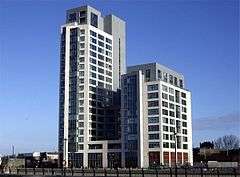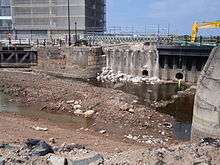Prince's Dock, Liverpool
| Prince's Dock | |
|---|---|
|
Prince's Dock, Liverpool Waterfront | |
| Location | |
| Location | Liverpool, United Kingdom |
| Coordinates | 53°24′32″N 2°59′56″W / 53.40889°N 2.99889°WCoordinates: 53°24′32″N 2°59′56″W / 53.40889°N 2.99889°W |
| OS grid | SJ336908 |
| Details | |
| Owner | The Peel Group[1] |
| Operator | Mersey Docks and Harbour Company |
| Opened | 1821[2] |
| Type | Wet dock |
| Joins | |
| Area | 11 acres (4.5 ha), 3,889 sq yd (3,252 m2)[3] |
| Width at entrance | 45 ft (14 m)[3] |
| Quay length | 1,613 yd (1,475 m)[3] |
Prince's Dock[4][nb 1] is a dock on the River Mersey, England, and part of the Port of Liverpool. It is the most southerly of the docks situated in the northern part of the Liverpool dock system, connected to Prince's Half-Tide Dock to the north. The dock is now in the buffer zone to one of Liverpool's World Heritage Sites.
History
Initially, William Jessop and John Rennie were consulted about the plans for the dock.[5] The dock was built by John Foster, with construction starting around 1810.[5] During the construction, Foster ordered many times more stone than was needed. Allegedly, Foster diverted it to his family's building company. He resigned when this was discovered.
The dock was named for the Prince Regent.[6] Still unfinished,[5] it opened on the day of the Prince Regent's coronation as George IV in 1821. Access to the southern half of the dock system was via George's Basin, George's Dock and into Canning Dock. In 1874 George's Basin was filled,[7] and in 1899 George's Dock was filled and the site used to create what is now the Pier Head.[8]
On 12 June 1895 Liverpool Riverside Station was opened, situated between Prince's Dock and the River Mersey.
In 1968 B&I Line (operator of the Liverpool - Dublin service) commenced a new car ferry service from Carriers' Dock further downriver. A passenger only service continued to use Prince's Dock until 1969.
Ferry services from Prince's Dock finally ended in November 1981 when P&O Ferries closed their Liverpool - Belfast overnight service. The dock subsequently closed to shipping and was partly filled.[9]
Redevelopment




Commercial redevelopment began when the dock was passed to the Merseyside Development Corporation in 1988.[10] Much of Prince's Dock's wharfage and warehouse space has been replaced by:
- Three blocks of office accommodation along the river front.
- The £24 million Malmaison 128-room hotel. It opened in 2007 and is its owning company's first ever 'new build'.[11] It stands alongside the existing Crowne Plaza hotel.
- Three blocks of flats.
The dock was partially filled in to inland canal boat depths precluding deep water vessels. The dock has been divided into two sections spanned by a pedestrian bridge[12] that was designed by the Liverpool John Moores University Centre for Architectural Research and Consultancy Unit (CARCU).[13]
By March 2009 work was completed[14][15] on a £22 million extension of the Leeds and Liverpool Canal, providing a further 1.4 miles of navigable waterway.[16] A new lock and fixed bridge was built at the northern end of Prince's Dock. At the south end of the dock, a new canal tunnel was constructed which leads to the Pier Head. The tunnel is routed beneath St. Nicholas Place and the access road for the new cruise liner facility.[17] From Prince's Dock, the extension passes the Pier Head and terminates at Canning Dock.[16]
In 2007, planning permission was secured for the £130million New World Square.[18] This was to have incorporated an eight storey, five-star hotel, 385 apartments and space for shops and restaurants.[19] However, planning permission for this development expired in 2010.[20]
In 2016, planning permission was granted for the 34-storey Lexington Liverpool.[21]
Cultural references
Prince's Dock is mentioned in the novel Redburn, His First Voyage by Herman Melville (1849):[22]
"In magnitude, cost and durability the docks of Liverpool surpass all others in the world... for miles you may walk along that riverside, passing dock after dock, like a chain of immense fortresses. Prince's Dock, of comparatively recent construction, is perhaps the largest of all and is well known to American sailors from the fact that it is mostly frequented by the American shipping."
It is also mentioned in The English at the North Pole, the first part of Jules Verne novel The Adventures of Captain Hatteras (1864).[23]
See also
- Liverpool Canal Link
- Plot 3a Princes Dock
- Alexandra Tower
- 1 Princes Dock
- Princes Dock railway station
Notes
- ↑ Although many texts give the name without an apostrophe as Princes Dock, this is an incorrect plural form. The dock is named for one prince; the Prince Regent, only.
References
- ↑ "Liverpool Canal Link Skipper's Guide 2016" (PDF). Canal & River Trust. p. 3. Retrieved 4 September 2016.
- ↑ Ashmore 1982, p. 163
- 1 2 3 Baines 1859, Part II, p. 116
- ↑ "Great Britain: OS Six Inch, 1888-1913". National Library of Scotland. Retrieved 12 October 2016.
- 1 2 3 Pollard & Pevsner 2006, p. 277
- ↑ McCarron & Jarvis 1992, pp. 71-73
- ↑ McCarron & Jarvis 1992, p. 40
- ↑ "Trading Places: A History of Liverpool Docks". Liverpool Museums. Archived from the original on 28 October 2008. Retrieved 20 March 2008.
- ↑ Trading Places: Princes Dock History, Liverpool Museums, archived from the original on 28 October 2008, retrieved 7 January 2008
- 1 2 Pollard & Pevsner 2006, p. 278
- ↑ Dennis, Jon (6 March 2007). "Malmaison, Liverpool". London: The Guardian. Retrieved 6 April 2008.
- ↑ "Liverpool Canal Link, before work began (Page 2)". Pennine Waterways. Retrieved 6 April 2008.
- ↑ "Walking through hoops. Footbridge at Princes Dock, Liverpool". The Construction Information Service. Retrieved 6 April 2008.
- ↑ "Liverpool Canal Link, March 2009 (Page 1: Salthouse Dock, Mann Island)". Pennine Waterways. Retrieved 8 July 2009.
- ↑ "New canal link to boost tourism". BBC News. 25 March 2009. Retrieved 8 July 2009.
- 1 2 "Liverpool Canal Link: The Scheme". British Waterways. Archived from the original on 28 July 2009. Retrieved 8 July 2009.
- ↑ "St Nicholas Tunnel". British Waterways. Archived from the original on 25 September 2010. Retrieved 8 July 2009.
- ↑ Spring, Martin (2007). "Liverpool docks to get £130m New World scheme". Building.co.uk. Retrieved 29 August 2016.
- ↑ "Major Development Projects / Princes Dock". The Mersey Partnership. Retrieved 4 April 2008.
- ↑ "Threat to New World Square scheme planned for Liverpool waterfront". Liverpool Echo. 27 January 2010. Retrieved 29 August 2016.
- ↑ "Developer Moda secures planning consent for £82m skyscraper on Liverpool’s waterfront". YBnews. 20 September 2016. Retrieved 21 September 2016.
- ↑ Picture Gallery: Princes Dock, The Black & White Picture Place, archived from the original on 5 January 2008, retrieved 20 March 2008
- ↑ "The Project Gutenberg EBook of The English at the North Pole". Project Gutenberg. Retrieved 7 September 2009.
Sources
- Ashmore, Owen (1982). The Industrial Archaeology of North-west England. Manchester University Press. ISBN 9780719008207. OCLC 8555887.
- Baines, Thomas (1859). Liverpool in 1859. London: Longman & Co. OCLC 43484994.
- McCarron, Ken; Jarvis, Adrian (1992). Give a Dock a Good Name?. Birkenhead: Merseyside Port Folios. ISBN 9780951612941. OCLC 27770301.
- Pollard, Richard; Pevsner, Nikolaus (2006). Lancashire: Liverpool and the South West. Yale University Press. ISBN 9780300109108. OCLC 63396571.
External links
| Wikimedia Commons has media related to Prince's Dock. |
- "Liverpool North Docks diagram". Archived from the original on 6 January 2009.
- Prince's Dock aerial photo


